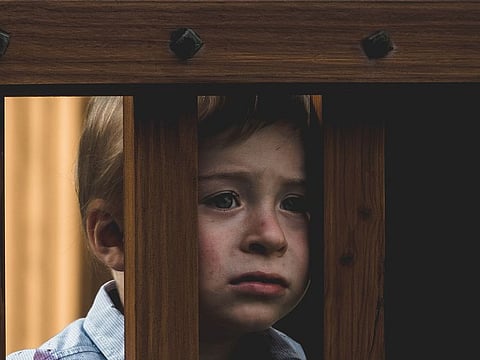UAE mum: 'My child is terrified of the night after a fire broke out in the building'
Dr Saliha Afridi offers tips on how to cope with an anxiety-provoking situation

A UAE-based mum is finding that after a fire broke out in her building at 1am, her child is becoming more and more anxious as night comes. Here, Dr Saliha Afridi, a clinical psychologist and Managing Director of The LightHouse Arabia, offers advice on how to cope with the situation.
Question: There was a fire in my building recently, and now my child is scared daily when it’s night-time. What should I do?
For context: The fire happened around 1am. I woke my 8-year-old up calmly and explained the situation to him that we needed to evacuate, he nodded his head and followed instructions. There were loud alarms and smoke in the corridor as we exited the building. Even though there was no panic, and everything went smooth that night, since then, every evening as it starts getting dark, he gets anxious and scared. He never had a problem being alone or getting to bed, now he needs someone close by to assure him there will be no fire at night. How do I address this issue?
Answer: Following a traumatic event, it is very normal to have symptoms of anxiety or increased arousal, which can include difficulty sleeping, extreme irritability, agitation, poor concentration, hypervigilance, exaggerated startle response and motor restlessness.
Here are a few tips for how to help your child through this tough time.
1. REINFORCE THE FACT THAT THEY ARE SAFE: The most important thing right now is to make your children feel safe. Bring them close to you, hold them in your arms, let them sleep next to you, hug more and give extra cuddles. This will give them a feeling of security, which is so important in the aftermath of a frightening or disturbing event.
2. SHARE INFORMATION ABOUT WHAT HAPPENED: Share information about what happened: It’s always best to learn the details of a traumatic event from a safe, trusted adult. Be brief and honest, and allow children to ask questions. Children are often worried about very different things than adults. Encourage your child to not watch social media videos of the event. It can be traumatic for a mind that doesn’t know how to process such an event.
Allow your children to express their feelings and know that they cope in different ways. Some might want to spend extra time with friends and relatives, whereas others might want to spend more time alone. Tell your children it’s normal to feel the way they are feeling.

3. EXPOSURE TO MEDIA: Prevent or limit your own and your family’s exposure to news coverage. This is especially critical if you have young children such as your son, as seeing disturbing events recounted on TV or in the newspaper or listening to them on the radio can make them seem to be ongoing. Children who believe bad events are temporary can more quickly recover from them.
4. STAY CALM: Do what you need to do to take care of your mental and physical health, and remain calm. Yes, you can tell your children you are sad and worried, but don’t have meltdowns in front of them (you can have them alone or with other adults). Children look to adults for reassurance after traumatic events have occurred. If you are emotionally all over the place they will feel more insecure. Do not discuss your anxieties with your children or when they are around, and be aware of the tone of your voice as children quickly pick up on anxiety. But don’t feel you have to be ‘totally ok’ as well. Express your sadness, but remain anchored and grounded when you speak to them.
5. HAVE A ROUTINE: This is one of the most important things you can do in times of chaos and crisis. Routines give a sense of safety and certainty and reassure children that life will be ok again. Try to have regular mealtimes and bedtimes. If you have lost your home to the fire and had to relocate, establish new routines and follow the same family rules quickly.
6. PLAY TIME IS GOOD: Have children engage in activities they find enjoyable. Encourage children to do activities and play with others. The distraction is good for them and gives them a sense of normalcy.
7. PICK GOOD TIMES TO TALK: Don’t do it before bedtime because it will make them feel scared. During the day is best. Look for natural openings to have a discussion.
8. NORMALISE WHAT THEY ARE FEELING: Allow your children to express their feelings and know that they cope in different ways. Some might want to spend extra time with friends and relatives, whereas others might want to spend more time alone. Tell your children it’s normal to feel the way they are feeling.
9. IT'S OK: Do not lecture or try to move them out of feeling the difficult feelings by saying “be grateful” or “don’t worry” until you have allowed them enough time to talk about their feelings. Instead, you can say, “it is normal to feel worried, but know that you are safe.” Let children know it is okay to tell you how they are feeling at any time.
10. KNOW THAT IT IS OK TO ANSWER “I DON’T KNOW": What children need most is someone whom they trust to listen to their questions, accept their feelings, and just be there for them. Don’t worry about knowing exactly the right thing to say. After all, there is nothing that you can say that will make everything okay, but creating the space for them to share their experience is healing.
Sign up for the Daily Briefing
Get the latest news and updates straight to your inbox








